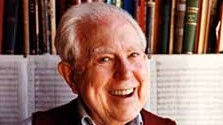
As a freshman in high school, I signed up for an email listserv focusing on 20th century music. Being from a small college town in Indiana, I hadn't had much exposure to classical music written after the Rite of Spring. At this point in my life, I hadn't even really considered the possibility of playing the violin professionally. In fact, my sentiments as recently as a year before would have led me to prefer prioritizing my spot on the wrestling team over playing a note on the violin ever again.
But, around my fifteenth birthday I began discovering music again, and finding that that the weirder it was the more I wanted to hear it. I wanted more than just to know about it, I wanted to "get it". This listserv proved pivotal in my musical development, even if I only followed it for a month and they never discussed much of what I now consider to be truly avante-garde.
A message discussing a disc of Boulez conducting Varese piqued my interest. Who was this Varese guy? However, I quickly found that the headliner of the disc (as far as my project to digest wildly new musical styles was concerned) was clearly the "Symphony of Three Orchestras" by Elliott Carter.
From the devastating Hart Crane quote in the liner notes to the sheer volume of musical ideas bursting from this piece, I knew I had found something I truly did not understand. But, it was a revelation. In not understanding, I saw a vast landscape of music in front of me, shrouded in fog. I couldn't even begin to know where the horizon was.
It was exhilarating to have this work take over my world so completely, with its impossibly expressive lines interacting in ways that never ceased to amaze. Listening to the piece again now, I feel lucky to have found it when I did. Just months later, when my private instructor planted the seed of working to be a professional violinist in my mind, visions of playing new and exciting music inspired me to take on the challenge.
To this day my perceptions of musical expression and time are being influenced and changed by Carter's infinitely subtle and sensitive art. In fact, as this blog post goes live, I will be rehearsing the fourth movement of his Second String Quartet with my mates in Spektral Quartet. Every rehearsal reveals the lines more clearly, hearing how they interact and converse in the most organic, yet unexpected, ways.
Just yesterday, as I walked out of a rehearsal of the quartet, my facebook feed was filled with memorials to Carter and his work. I can think of no more fitting way to find out of his passing than from my peers. His music will be a constant in our lives, an unavoidable pillar of the American canon. I know my story is far from special - many of us were introduced to the deep questioning and probing expression of great new music through Elliott Carter's work.
